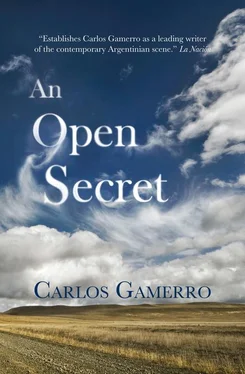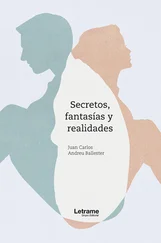“Not everyone gave their consent,” I object.
“That’s true,” the professor concedes. “In a way the Superintendent cheated. Himself. He didn’t ask at random, his probing was selective. He didn’t ask the mother. He didn’t ask me. He didn’t ask people who could … stop him.”
“But you knew,” I say. “You were in the know, like everyone. Why didn’t you go and see him ?”
“I wanted him to come to me,” he answers unhesitatingly. My incisive question has dissipated the thin veil of equanimity behind which the professor’s prolix indignation had momentarily concealed itself, and again his chin trembles and his eyes harden over. “To see if he had it in him. Had I gone to see him , it would’ve been a sign of weakness.”
He stands there staring at me, his lower jaw jutting slightly and open, fists clenched, neck tense. I ought to go on with my half-hearted inquisition but I can’t, because I’m already far away — in the window seat I’ve booked on the 4.50 La Verde coach to Rosario, staring at my own reflection in the glass against the black of the invisible fields; on the 7.15 Chevallier to Buenos Aires, the sun still floating like a balloon just above the rectilinear horizon of the pampas and shining high above the Retiro coach terminal when I’m reunited with my wife and son. I’m not here any more, I’ve finished, I’m on my way back, I think, cupping my hands over my closed eyelids. I light a cigarette and look at the professor.
“What did you play?” I ask him.
TIME TO GET MOVING. Since I told Guido, with tacit permission to broadcast it, the News has already been round town several times. At first Celia did what she could to hold back the rising tide of visitors, adducing my delicate state of health; but as my health improved and my excuse weakened, at the risk of sounding rude and coming in for criticism, she was forced to give in. Auntie Porota and Auntie Chesi, Vicente and Vicentito, Alfredo Sacamata senior, Don Eugenio Casarico, the loathsome pharmacist Mendonca, who furiously I refuse to see, and many others I don’t know or only by sight introduce themselves, I worked for Señora Delia, she helped me, she gave me, I was so sorry to hear about your … My visitors insist on referring to “your father”, your “dear grandmother”, and suddenly their faces, once perfectly camouflaged in mine, shine brightly through my features; people’s eyes overflow with tears, their hands with presents and their mouths with stories that display an alarming tendency to morph into cloned versions of the heroic struggle of a town to wrest from the despicable clutches of the police two heroic inhabitants, whose praises they sing for the benefit of their no-less-heroic descendant. I entreat Celia with my eyes to chuck them out as soon as possible and pretend to be asleep but it only makes matters worse; when word gets out that I’ve woken up, they flock in in droves. What a good thing I concealed it from the outset — I tell myself, my hacker’s instinct didn’t let me down. I’m not a sponge, I can’t absorb so much remorse. They can settle any pending accounts of conscience with the priest, I didn’t come this far to be a catalyst for collective catharsis. Collective but not mass catharsis, I note a few days later when I step out into the street. Dr Alexander crosses the road to avoid me, a young man driving a dazzling four-by-four I’ve never seen before eyes me grimly and turns out to be one of Rosas Paz’s grandchildren, Batata Sacamata has vanished from the table at Los Tocayos, whose other members Guido has kept away from my sickbed with the promise that I’d drop in as soon as I was better. Nene Larrieu comes and goes, filling the constantly emptying glasses and emptying the constantly filling ashtrays.
“I’m not saying what you did was wrong,” Don León insists. “But in a way you did abuse our good faith. I reckon if you’d’ve been open about it from the start, without hiding anything from us …”
“Ezcurra never said anything,” murmurs Iturraspe still in the grips of delayed shock. “In all the years we … The best-kept secret in Malihuel. We didn’t know he had a son then. If we’d known, that you … you were, or rather that he, and you … Your Papá. If we’d known you then, and … But we didn’t know,” he concludes eventually.
“Nor did I,” is the only thing I seem to be able to reply.
“There’s something I need to tell you …”—Licho joins in the conversation—“… you know how it is, someone or other says I saw Ezcurra in such-and-such a place and the story catches on and gets passed on by word of mouth and you try persuading people otherwise then, you know how stories get better and better with the telling and they get to a point where they’re perfect and nobody can add anything to them and they repeat it word for word, even the one who started the ball rolling,” he blurts out in one breath and slumps backs in defeat.
“Anyway”—Don León goes on the offensive again and everyone out of habit goes quiet to listen to him—“you have to be from hereabouts to understand these things. It’s easy for someone from outside …”
Out of the corner of my eye I see the colour rising in Guido’s face and race to head him off.
“Both my parents and all four grandparents are from Malihuel. I was conceived here and baptised here. I spent every summer of my childhood here, with the best friends I’ve ever had. My father died here and is buried here — or submerged if you prefer — and my grandmother’s heart was broken here with grief. Malihuel made me and Malihuel unmade me. What outside are you talking about?”
“Yes but what I’m saying’s different. Coming here to visit isn’t the same as … Besides, it’s not as if those two actually were your father and grandmother. You yourself said that …”
This time I don’t get there in time.
“Why don’t you shut up?” Guido spits at him. A spectral silence falls over the bar. Even the hands on the clock seem to be waiting.
“What did you say?” Don León stares at him in disbelief.
“Why — Don’t — You — Shut — Up?” Guido articulates with offensive clarity. “Do you think we’re going to sit here straight-faced all our lives listening to you spouting garbage? Don’t you think we might be fed up of always having to listen to the same old bloody shite? Eh?”
Don León looks at all of us. Blank, impassive faces that give his potential indignation no purchase whatsoever. His chin trembles slightly as he answers:
“All right, Guido. Apologies. No offense intended.”
“And you wanted me to tell you from the start,” I rib him later on, when he gives me a lift to his Mamá’s. He smiles in profile, without saying a word. He’s glad, but not just for me. The table in Los Tocayos has just changed hands.
“BEFORE YOU GO DEAR BOY”—Professor Gagliardi intercepts me—“I have something for you. I’ve been working on it for twenty years. I began when I realised that everyone in town knew what happened and bore their share of the responsibility. But to claim they were all guilty like that, across the board, is almost like saying no one was, which is why I set out to establish, as far as I could, how and how far each of Malihuel’s inhabitants played a part in this tragedy, what they did or didn’t do, what they said, and how they acted before, during and after the events. This is the result,” he says advancing towards me, with a bulky, black-and-white marbled folder in hand. “I’d feel honoured if you’d accept it. It will tell you everything you want to know about the people who killed your father and grandmother, and many other things besides. All the basenesses committed in the last decades of the life of our town, including those the law would punish were it applied, and the petty daily crimes that fall outside its scope are recorded in them. If you really intend to put it all down in a book, I daresay you’ll find them to be of great help, perhaps indispensible.”
Читать дальше












